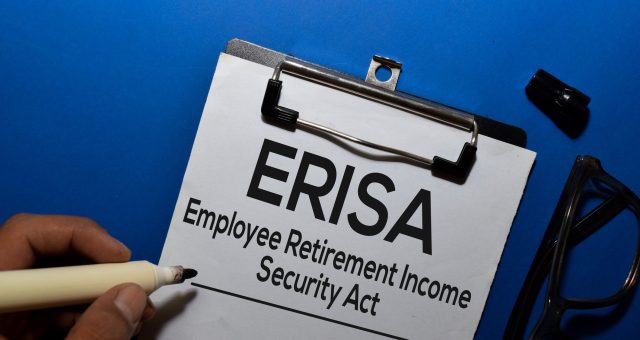Celebrating ERISA At 50?


When the Employee Retirement Income Security Act makes headlines, it’s usually something for plan sponsors to worry about, such as lawsuits, increased regulatory measures or cybersecurity concerns. But here’s celebratory ERISA news: the 50th anniversary of the law’s passage offers a moment for employers to take pride in securing the retirements of millions of workers.
Studebakers and ERISA: A Brief History
Studebaker, the automobile manufacturer, shut down in 1963, leaving thousands of workers without their promised benefits, essentially setting off a ten year public scurry to put protections in place:
Sparked by the failure of a major automaker and signed into law on Sept. 2, 1974, by a United States president named Ford, the Employee Retirement Income Security Act (ERISA) provided wide-ranging guardrails for pensions and other employer-provided benefits….The law that Gerald Ford greenlighted remains the rule of the road, protecting participants in employee benefit plans from abuse….ERISA sought to ensure pension promises would be kept, but ultimately did much more. Among its provisions, the law:
- Established minimum funding, disclosure and reporting, coverage, and nondiscrimination requirements for employer-provided pension plans. These provisions and subsequent amendments have served to “generally make it easier for employees to obtain retirement benefits….”
- Created the Pension Benefit Guaranty Corp. (PBGC) to insure private pension plans and provide benefits to the beneficiaries of terminated ones. In 2023…920,000 beneficiaries received more than $6 billion in annual benefit payments, while another 31 million employees were in PBGC-insured plans.
Although ERISA did not directly create the 401(k), the law certainly paved the way for these popular employer sponsored defined benefit plans, and, as Mark Toner at World of Work explains, governs the fiduciary standards associated with the 401k:
In 1980, legislation allowing tax-advantaged defined contribution retirement plans went into effect. The 401(k) quickly became a household name, and traditional pension plans dwindled….Defined contribution plans still benefit from ERISA, which governs their fiduciary standards, reporting and disclosure, and nondiscrimination rules that ensure benefits don’t go solely to the highest-paid employees. ERISA also enabled automatic payroll deductions for these plans, “allowing the retirement system to meet evolving worker needs,” said Barb Marder, president and CEO of the Employee Benefit Research Institute (EBRI).“ERISA didn’t create defined contribution plans, but it allowed for them as an evolution of the retirement system, which was equally important,” she said. Subsequent legislation and regulations have added new features to defined contribution plans to improve participation, including automatic enrollment, escalating contributions and default target-date funds.
Protection For All?
Data from the Employee Benefit Research Institute points to the difference retirement plan sponsors make as they execute their responsibilities under the high standards of ERISA: retirement confidence is “more than twice as high among those with retirement plan coverage than among those who lack it.” Of course, challenges remain: longer lives and higher costs of living are rapidly increasing the amount of savings needed to retire successfully. In fact, with many workers struggling to pay off debt and cope with the toll of inflation, the work plan sponsors do toward the success of the company plan is ever more important. As Groom Law Group reminds us: “Being a fiduciary is about more than just avoiding lawsuits—it is about improving participant outcomes.”
As plan sponsors across the country row forward with efforts to secure the retirements of the millions of workers counting on them, it’s wise to put solid protections in place for themselves too. Leading, national and Treasury-listed writer of required ERISA Fidelity Bonds, Colonial Surety Company, is pleased to make it easy for plan sponsors to substantially reduce their own liabilities via fiduciary and cyber liability coverage. As employee benefit experts from Bricker Graydon underscore: “Without fiduciary liability insurance you…can be held personally liable for a breach of fiduciary duties. These claims are almost always very costly. Not only are the costs of going to court and defending yourself high, but the chances of losing or having to settle are also incredibly high… Without fiduciary insurance, an accusation can cripple an ill-prepared business.”
Additionally, given the rise of cyber threats, the DOL now urges cyber liability insurance that explicitly covers the business and plan. Remember, even a relatively small cyber incident can result in a fiduciary breach allegation that puts personal assets at risk. Colonial’s affordable Fiduciary+Cyber Liability Insurance Combo addresses Department of Labor recommendations, explicitly covers the business and the plan in the event of a cyber breach—and significantly reduces personal risks.
Opt in to add Fiduciary and Cyber Liability to your ERISA Bond, and for less than a few dollars a day, you’ll immediately have documented proof of cybersecurity coverage for the business and plan, and defense costs and penalty limits up to $1,000,000 for yourself, if faced with alleged or actual breaches of duty in connection with the employee retirement plan.
ERISA Bond+Liability Insurance HERE
Need Help?
Our knowledgeable, New Jersey based ERISA service team is available directly, Monday-Friday, 8:30am-5:30pm EST at 888-383-3313 and via email: erisadept@colonialsurety.com.
Colonial Surety was founded in 1930 and continues giving customers the assurance that they, their businesses, and their clients are safeguarded with the right surety and insurance products at all times. We are a direct and digital insurer offering products through an online platform supported with exemplary customer service. We give customers a simple, direct, and instant service that takes the pain out of buying insurance and bonds. Colonial Surety is licensed in every state in the U.S., rated “A” Excellent by A.M. Best, and listed by the U.S. Treasury as an approved surety.

